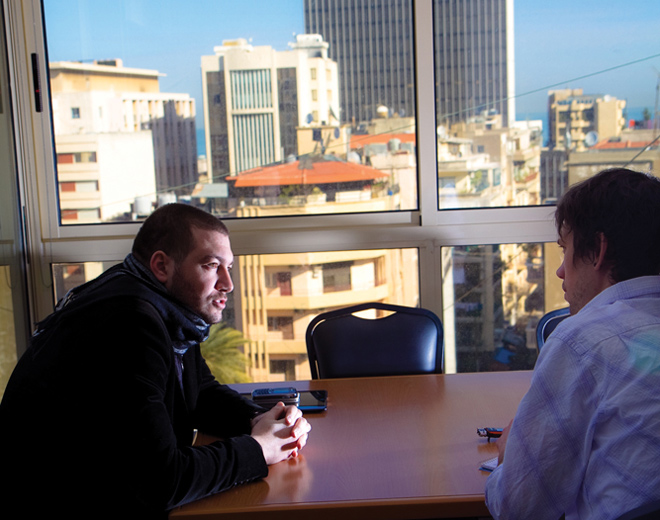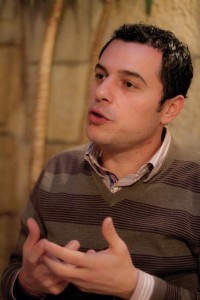Alumni Focus Efforts on Future Generations

Prompted by this reality, Hassouna founded the Development for People and Nature Association, or DPNA, in 2003 to mentor, empower and encourage Lebanese youth to do things differently.
“If you want to build positive change and achieve positive results, you have to build on new human resources, and that’s why I started with the youth,” says Hassouna.
Based in southern Lebanon, DPNA has worked on a wide variety of projects across the country, ranging from civic engagement, entrepreneurship, and peacebuilding to basketball camps. Regardless of the project’s specifics, Hassouna has kept constant focus on the empowerment and development of young people, who represent both his country’s future as well as its biggest resource.
Now preparing to step aside and hand leadership of DPNA to younger leaders with fresh energy and ideas, Hassouna said his biggest achievement is the confidence he now has in some of those young leaders preparing to take over.
Addressing Helplessness
One of the young people mentored by Hassouna is Rami Shamma (SPI ’08), who has worked with the DPNA since 2006. Originally trained as a computer engineer, Shamma has experienced himself some of the obstacles that fuel a rampant apathy among young people in Lebanon. Among these is the “wasta” system, a form of nepotism or cronyism prevalent in Lebanese politics and economic life that rewards family and sectarian loyalties more than qualifications or ability. Also, the simple fact that Lebanese civil society is stifled by entrenched powers discourages youth interest and involvement.
“Before I enrolled in DPNA, I was the kind of person who didn’t care about anything at all,” says Shamma, adding that this perspective was shared by almost all his peers.
Shamma says he was fortunate to become involved with the DPNA when he began assisting his father, who taught computer classes for the organization. Soon thereafter, in the summer of 2006, a war with Israel displaced huge numbers of people within Lebanon. Hassouna, who had gotten to know Shamma, encouraged him to apply for a position with a DPNA emergency relief project in southern Lebanon.
Shamma took the job, and later became the manager of another DPNA project to encourage youth participation in the political process. Because of that effort, nearly 40 youth ran for local office or worked for electoral campaigns in 2010. Several of them won election to public office. The fact that so many more simply participated, however, is even more exciting to Shamma. He currently manages a project for DPNA that develops youth entrepreneurship and leadership skills.
Through his involvement with DPNA, Shamma says, he found new direction and focus in life, which he intends to spread as widely as he’s able. His biggest hope for the future is to see young people talk more, think more, act more; it is both an enormous challenge, he says, and a worthwhile one.
Hopeful Work

Working with young leaders is also atop the agenda for Fadi Rabieh, MA ’08, who oversees the Israeli-Palestinian Leadership Network, a Jerusalem-based program of Search for Common Ground, an NGO that works worldwide on conflict resolution and peacebuilding.
In that role, Rabieh is working on creating a network of Palestinian and Israeli leaders across the various sectors and divides. (One of the participants in this program is Maysa Baransi, SPI ’09; see her story.)
“We are in a leadership crisis in this part of the world,” says Rabieh, whose hope is to create a strong network of creative, engaged young leaders who will help untangle the problems facing Israelis and Palestinians.
One strategy he has been using is pairing young Israeli and Palestinian leaders within each side’s political, religious, business and civic sectors. Often, Rabieh says, these leaders have more in common with counterparts across the border than they do with other people within their own societies.
“They have a group culture – profession – that binds them together. That kind of identity, in my opinion, is sometimes stronger than ethnic identity.”
To facilitate trust and friendship between these leaders, Rabieh brings them together for a variety of experiences, including wilderness expeditions facilitated by the Outward Bound Center for Peacebuilding. As they develop relationships with one another, Rabieh continues, they begin to empathize with one another, and conceive of “the other side” in more human terms. Awareness of and appreciation for the surprising similarities that exist among people on either side of traditional dividing lines begins to play a role in the decisions they make as leaders within their respective communities. Gentle nudges from leaders within their various communities, he says, can have tremendous impact on the wider peace process.
“That’s the beauty of working with leadership,” says Rabieh, who has found the work profoundly encouraging and hope-inspiring. “I believe everything is possible. Peace is possible, love is possible, brotherhood is possible. As a result of my work with these people, I have lots of faith in the goodness of the human being.”
Breaking the Cycle
In Ramallah, a Palestinian city north of Jerusalem, Ruba Musleh, MA ’08, is working on a different project to develop entrepreneurship and career skills among Palestinian youth, some of whom may go on to become the kinds of leaders Rabieh works with. As a youth entrepreneurship specialist with the International Youth Foundation, Musleh works to strengthen the capacities of numerous partner institutions that work with young people in the West Bank. Her work includes grant implementation, coaching and training to help these partners provide quality services to youth.
“These are the leaders of tomorrow. These are the people who are going to build and develop Palestine and ensure a sustainable peace [here],” she says.
There has been no shortage of well-intentioned efforts to achieve similar goals over the years in Palestine, Musleh notes. Lack of coordination between the various NGOs working on these projects, however, has been a significant challenge and has led to what she describes as a constant “reinvention of the wheel.” Different groups come in to provide the same trainings and teach the same skills to the same youth over and over, and nothing really changes.
While the project she is working on is new, Musleh says one of its unique characteristics, designed to avoid the pitfalls of previous efforts, has been the development of partnerships with Palestinian entities, including the private sector and universities. By collaborating with private Palestinian businesses, Musleh’s project supports internship programs that develop employability and entrepreneurship skills, while providing practical work experience. Another benefit of bringing in the universities and private sector is to develop local ownership of and accountability for the work that International Youth Foundation is doing. This, she says, is an important way to ensure the work now underway comes to fruition, even if external funding decreases or ends at some future point (See story on p.8 for more on this challenge to peace and development work in the region).
“A lot of work [still] needs to be done in this area, but we’re going in the right direction,” Musleh says.
School vs. Fanaticism
Still other alumni are working with youth at an even earlier age, including Michael Chacour (SPI ’08), executive manager at the Mar Elias Educational Institute in Ibillin, Israel.
The school, which has more than 4,500 students from kindergarten through university, was founded by Chacour’s well-known uncle, Bishop Elias Chacour, and is affiliated with the Melkite Church, a Middle Eastern branch of Catholicism. More than 70 percent of the student body comes from Muslim families. The school, Chacour says, places strong emphasis on cultivating respect for and acceptance of differences among its diverse group of students. In this way, he continues, the school stands as a counterbalance to the forces of fanaticism that continue to divide the Middle East.
“Accept the others as you accept yourself. This is what Jesus teaches us and this is what we teach our students,” he says. — AKJ
(For more information on the history of the Mar Elias Educational Institute, see Elias Chacour’s 2001 memoir We Belong to the Land –The Story of a Palestinian Israeli Who Lives for Peace & Reconciliation, published by the University of Notre Dame.)
“These are the leaders of tomorrow. These are the people who are going to build and develop Palestine and ensure a sustainable peace [here].”
“I believe everything is possible. Peace is possible, love is possible, brotherhood is possible. As a result of my work with these people, I have lots of faith in the goodness of the human being.”